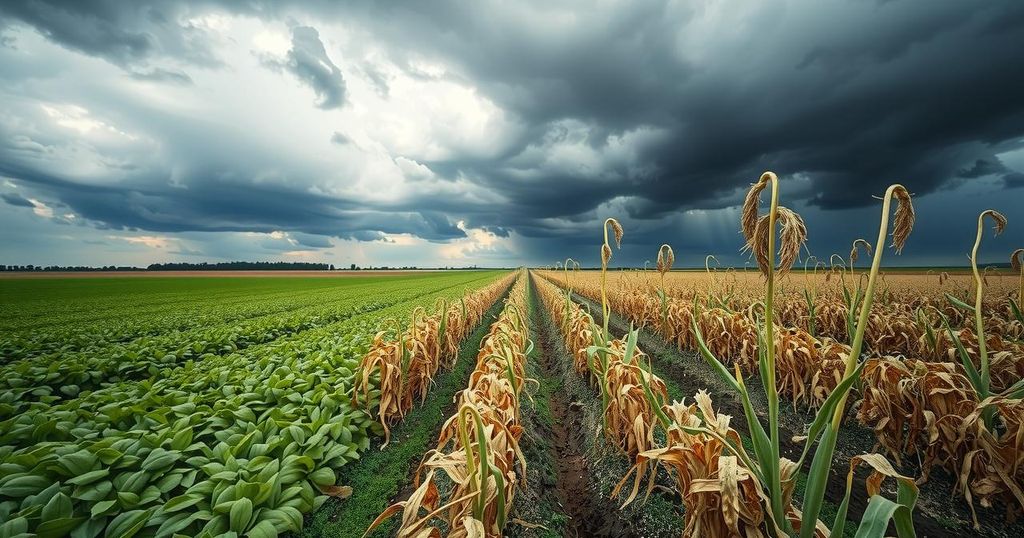Extreme weather events are increasingly destroying crops worldwide, significantly impacting agriculture. Reports indicate widespread losses across various crops due to climate change. Research highlights the necessity for resilient food systems and adaptation strategies to mitigate these challenges and sustain agricultural productivity globally.
The impact of extreme weather on global agriculture is becoming increasingly severe, with reports indicating devastating losses in crops such as corn in Tanzania, coffee in Vietnam, and Kampot pepper in Cambodia. Such events have grown more frequent since the mid-20th century, particularly influenced by climate change, which is pushing traditional food-growing regions into climatic instability. Experts express concern about the cumulative impact of these events on agriculture, emphasizing the need for resilient food systems.
Carbon Brief’s research examined 100 instances of crop destruction due to extreme weather from January 2023 to December 2024, sourced from media reports and UN data. This map reflects diverse weather-related vulnerabilities across different regions, noting that English-language reports highlight geographical gaps in understanding agricultural impacts, particularly in the Global South. High confidence exists that continuing weather extremes will disrupt production increasingly as harsh climatic conditions settle in.
The remnants of natural disasters are profound. For instance, a typhoon in 2012 severely affected the banana industry in the Philippines, with recovery taking five years. According to Dr. Monica Ortiz from the University of Concepción, such events turn production into a slow path to recovery. Meanwhile, in Nepal, climatic shifts necessitate apple cultivation at higher altitudes and threaten famous citrus crops due to rising pests and disease, as noted by Ananta Prakash Subedi, an assistant professor at the Agriculture and Forestry University in Nepal.
Climate change poses multifaceted risks that interlink with trade disruptions, geopolitics, and agricultural volatility, as highlighted by Professor Andy Challinor from the University of Leeds. He emphasizes that predictably managing such outcomes is challenging. The interactivity of these disruptions demands a systematic resilience approach for food systems, which is essential in addressing setbacks from these extreme weather events.
Carbon Brief’s evaluation reveals a wide range of crops affected by extreme weather. The unpredictability tied to weather extremes notably complicates food production outcomes. Human-induced climate change exacerbates these issues, leading to increased frequency and intensity of adverse weather. Recent studies have quantitatively analyzed how climate change affects weather-related events and their consequences, such as a significant attribution study on the flooding in Rio Grande do Sul, Brazil, which resulted in staggering losses for soybean farmers.
The El Niño phenomenon significantly contributes to drastic weather variations, as witnessed with the destruction of half of Zimbabwe’s maize crop due to drought conditions in 2024. Concurrently, Latin America faced dual challenges of drought and wildfires, adversely influencing both livestock and crop productivity. The absence of comprehensive evaluation of the livestock sector in this analysis highlights an area in need of continued examination. Moreover, extreme heat adversely affects agricultural labor, with workers often forced to change schedules to adapt to the rising temperatures.
Conversely, certain crops could benefit from climate change, with improved conditions for durian, mango, and various fruits in warmer regions. Anticipated warming may allow for expanded crop cultivation in previously unsuitable areas, potentially enhancing farming yields in places like the UK. However, the overarching threat remains: a projected 2C rise in global temperatures by century’s end is expected to severely impact food production systems, leading to widespread climatic unsuitability for crops and livestock.
Risk assessments indicate that multi-region climate impacts pose a significant future threat, introducing a need for robust adaptation strategies. The IPCC emphasizes sustainable resource management and the integration of local knowledge. However, challenges persist concerning funding and the implementation of these practices, with only 4% of global climate finance allocated to agri-food systems.
Emergency relief mechanisms like crop insurance are becoming increasingly inaccessible due to rising costs, restricting farmer capacity to manage and overcome extreme weather impacts. Dr. Ortiz underscores the necessity of linking research with practical solutions, stating, ‘The question is how do we match up the research and technology with what happens on the ground.’ This emphasis on strategic adaptation remains critical as the agricultural landscape continues to rapidly evolve under climate pressures.
In summary, extreme weather is severely impacting global crop production, exacerbated by climate change. The need for resilient food systems is urgent, as evidenced by increased losses and geographical shifts in agriculture. Adaptation strategies, financial aid, and innovative farming techniques are essential to mitigate these challenges, while further research is required to better understand the implications for livestock and broader food systems. A proactive approach to climate adaptation will be crucial for sustaining agricultural productivity worldwide.
Original Source: interactive.carbonbrief.org






